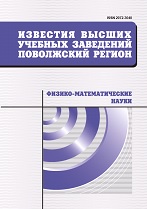|
|
University proceedings. Volga region. Physical and mathematical sciences, 2014, Issue 4, Pages 47–56
(Mi ivpnz319)
|
 |
|
 |
This article is cited in 2 scientific papers (total in 2 papers)
Mathematics
On synthesis of unreliable element circuits in $P_4$
M. A. Alekhina, S. P. Kargin
Penza State University, Penza
Abstract:
Background. In modern engineering and mathematics in a majority of cases scientists use bivalent logic. Such historically established situation is predetermined by its relative simplicity, and thus this system is more preferable to be applied (in comparison with other logical systems) from engineering and economic points of view. Main model subjects functioning on the basis of bivalent logic (for example, unreliable element systems, nonbranching programs) are quite sufficiently examined at the moment. However, the complexity of problems to be solved and, therefore, technical devices is constantly rising. Polyvalent logic offers broader opportunities to develop various algorithms in many fields. It allows to decrease computational complexity, as well as sizes, numbers of links in various arithmetic-logical devices, to increase density of element placement in circuits, to find alternative solutions of problems. By this time polyvalent logic has been successifully implemented for solving multiple problems and in many engineering developments. Among such there are various arithmetic devices, AI and data-processing systems, devices for complex digital signal processing etc. Of special interest is a problem of researching functioning reliability of circuits in a complete finite basis consisting of k-valued functions (k $\leq$ 3). The problem of building reliable circuits in a random complete basis consisting of three-valued functions (i.e. k=3) was solved in the thesis by O. Yu. Barsukova. The aim of this article is to reveal properties of four-valued functions, the circuits of which may be used for reliability increase of initial circuits, and to describe the corresponding method of synthesis. Results. The authors revealed the properties of functions, the circuits of which may be used for reliability increase of initial circuits, and described the corresponding method of synthesis. The researchers obtained the upper and lower values for a number of such functions. Conclusions. The properties of three-valued functions, the circuits of which may be used for reliability increase of initial circuits, may be generalized to four-valued functions.
Keywords:
four-valued logic functions, unreliable functional elements, synthesis of unreliable element circuits.
Citation:
M. A. Alekhina, S. P. Kargin, “On synthesis of unreliable element circuits in $P_4$”, University proceedings. Volga region. Physical and mathematical sciences, 2014, no. 4, 47–56
Linking options:
https://www.mathnet.ru/eng/ivpnz319 https://www.mathnet.ru/eng/ivpnz/y2014/i4/p47
|

| Statistics & downloads: |
| Abstract page: | 40 | | Full-text PDF : | 11 | | References: | 11 |
|




 Contact us:
Contact us: Terms of Use
Terms of Use
 Registration to the website
Registration to the website Logotypes
Logotypes








 Citation in format
Citation in format 
